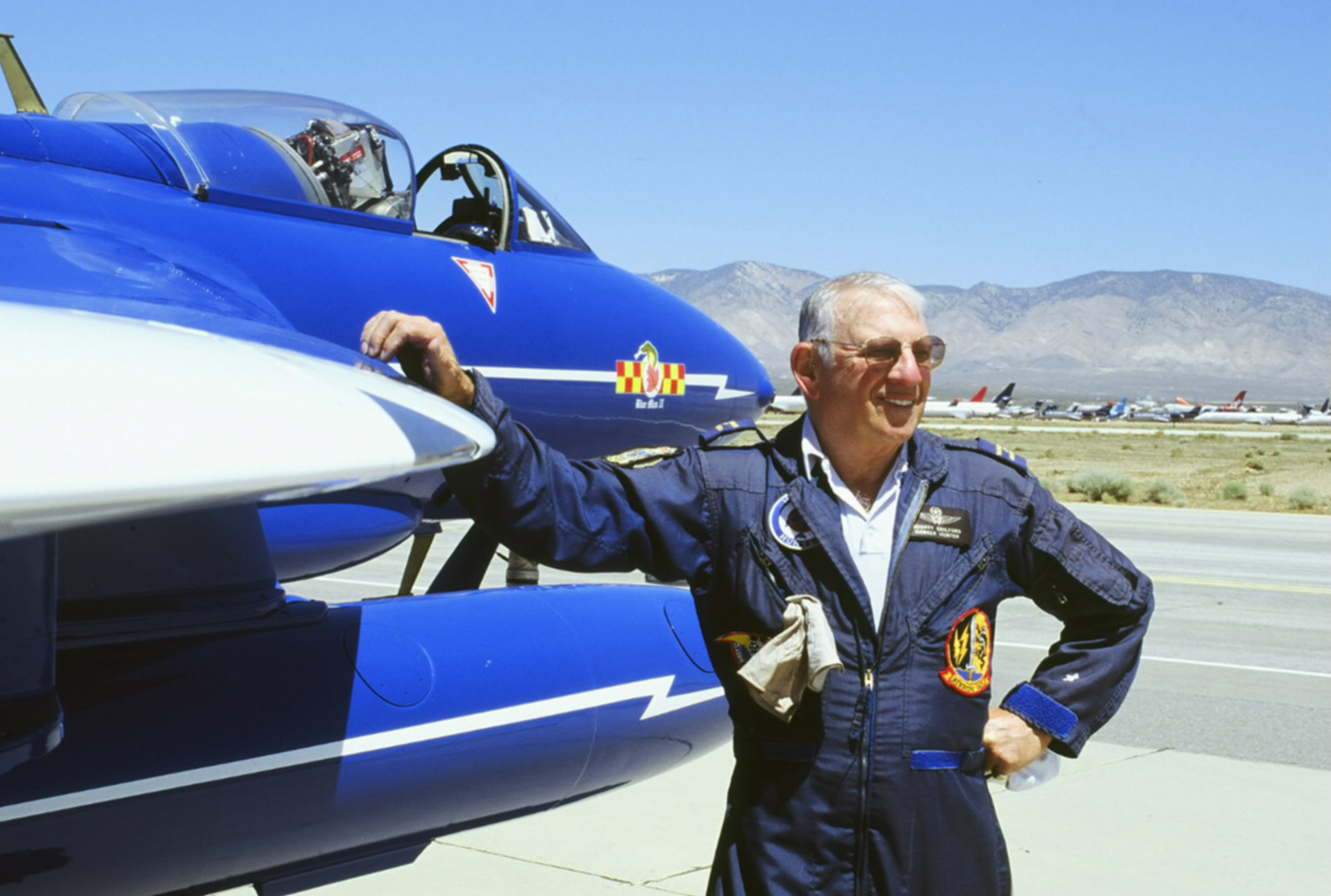By Terry Stephens
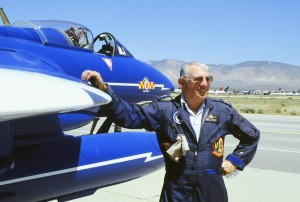
Robert Guilford enjoyed flying warbirds, particularly this Hawker Hunter Mk. 58, the plane he was flying when he crashed at Portland-Hillsboro Airport as he departed for his return trip home to California.
Aviation attorney Bob Guilford, 73, was known nationally for his love of aviation, particularly flying warbirds at air races and air shows. Since his death on July 16, he’s also known as a hero. He died when his Hawker Hunter Mk. 58 British jet fighter crashed as he was leaving the Oregon International Air Show in Hillsboro.
Near the end of the air show, as Guilford lifted off from Portland-Hillsboro Airport (HIO) to return home to Los Angeles, his 1950s warbird lost power. Rather than eject, Guilford stayed with his plane, witnesses reported, steering it away from a large shopping center and toward nearby empty fields. The plane fell short, crashing and exploding in an empty house with a blast that spread fire to three adjoining homes. Only one of those homes was occupied at the time, but the family escaped harm.
Those who knew him professionally describe Guilford as a brilliant lawyer who represented victims of aviation accidents. A native of Cleveland, Ohio, and a graduate of the University of Virginia and Harvard Law School, he spent the last 14 years of his career with the Los Angeles law firm Baum Hedlund.
Guilford attained the highest rating given by Martindale Hubbell, the international legal resource and information directory. He also was listed in the Bar Register of Preeminent Lawyers, Who’s Who in America, Who’s Who in American Law and South California Super Lawyers.
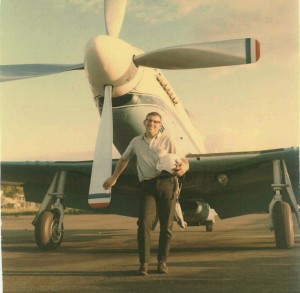
Robert Guilford purchased his first P-51 in 1964. He owned a variety of early warbirds over his lifetime and loved flying to air shows for both static displays and flying events.
Guilford’s law practice included airline crash litigation, aviation accidents, aviation product liability and mass disaster litigation.
“He was a lawyer, but that was just his way of enabling his flying habit,” said his son, Steve Guilford, in Los Angeles.
Family members, friends and his colleagues in the law community described Guilford as “an experienced pilot” who spent much of his life flying or thinking about his next flight. He began flying in 1958 after graduating from Harvard, and soon earned his commercial and instrument ratings.
A member of the Lawyer-Pilots Bar Association and Aircraft Owners and Pilots Association, he was a cofounder and active member of Warbirds of America, now part of the Experimental Aircraft Association, and enjoyed the distinction of being the fourth member to join the group.
Guilford also helped to start the Museum of Flying in Santa Monica, Calif., was chairman of the board of directors of the Classic Jet Aircraft Association, and founded and was president of the Mustang Pilot’s Club Inc. He served as vice president of Supermarine Aviation, Ltd., Liberty Aero Corp. and NATO Aviation. He was legal counsel to Transonic Flight Test, Ltd., which operated Folland Gnat aircraft, and Hunter Flight Test, Ltd., operators of Hawker Hunter jet fighters.
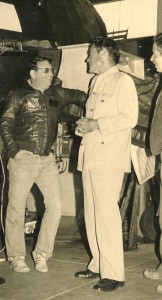
Robert Guilford visits in 1976 with Maj. Gregory “Pappy” Boyington, WWII ace and subject of the “Black Sheep Squadron” television show. Behind the pilots is Guilford’s Blue Max Corsair that he flew for years at the Reno Air Races.
His son said his father logged more than 4,000 hours of flying over 45 years and owned a variety of older warbirds, including a P-51 Mustang, a Corsair and his favorite, the British Hawker Hunter jet in which he died.
“My grandmother would be proud to know that he did everything he could to protect the people on the ground,” Guilford said. “That was certainly part of his ethic.”
Guilford said his father began flying vintage planes long before it became fashionable for Hollywood movie stars to take flying lessons, and before the rare and valuable planes were selling for hundreds of thousands of dollars. He said his father was so proficient as a pilot, particularly in the Hunter, that he was the only one in America authorized by the FAA to train other pilots to fly the single-engine jet that was once part of the Cold War of the 1950s and 1960s.
He began racing his F4U Corsair, the Blue Max, in 1970 at the California 1000 race at Mojave. He competed for 17 years at the Reno Air Races and regularly traveled to air shows throughout the nation.
“But he was up there more to tool around that he was to be competitive,” said his son.
Over the years, Guilford’s photo has appeared on numerous covers of aviation magazines and in articles and books about aviation topics, including air racing. He also owned or partnered with others in buying an AD Skyraider, Spitfire, F8F Bearcat, T-6, T-28, Hawker Sea Fury and a Soko Galeb G-2A, the first Yugoslavian jet design, produced in the 1960s as a trainer and light attack aircraft.
Air shows were a magnetic attraction for Guilford. His wife, Judy, a nurse and a pilot herself, often flew with him.
“Four or five times a year Bob would fly off to air shows,” recalls Michael Baum, senior partner of Baum Hedlund. “Whenever there was an air show with vintage aircraft, he would go. It was his big hobby.”
Attorney Paul Hedlund called Guilford “a very seasoned attorney.”
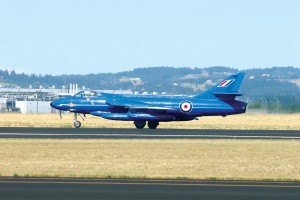
Veteran Pacific Northwest air show performer and longtime friend Bud Granley captured this photo just before Robert Guilford took off from Portland-Hillsboro Airport.
“He was very smart and very knowledgeable in what he did,” he said. “He was my oldest friend here. When I graduated from law school and had no place to live, he said I could stay at his place on his sofa. I did that for five years. . It’s very difficult; you spend half your life with a person and they’re gone.”
A new website, www.bobguilford.com, has been created as a tribute to him. The website now includes the last two photos of him before he took off on his fatal flight, taken by longtime friend and Pacific Northwest air show performer Bud Granley. It also includes a variety of remembrances that have been emailed to the law firm and to Steve Guilford.
“The website is a great tribute to someone who is now regarded as a hero in the Hillsboro area,” one email to Guilford’s son said. “Everyone who loves planes knows that your father was a hero. He got the plane down with the least amount of damage.”
A former client who flies vintage planes wrote that he got to know Guilford through a near fatal crash.
“He gave me hope and believed in my case,” he said. “He put my mind at ease.”
Steve Guilford traveled to Oregon to recover his remains, saying, “I will complete his flight.”
“Our family is extremely grateful for the generous outpouring of care and concern from friends, colleagues, clients and even air show fans who never met him personally,” he said. “The community of Hillsboro has shown gracious understanding and support throughout this tragedy.”
Bob Guilford’s family has asked that donations and memorials be sent to a charity of the donor’s choice or to either the Bob Guilford Charity Fund (EAA Warbirds of America, 3000 Poberezny Rd., Oshkosh, WI 54903) or to VHL Family Alliance International Headquarters (2001 Beacon Street, Suite 208, Boston, MA 02135) to aid pediatric cancer research.











